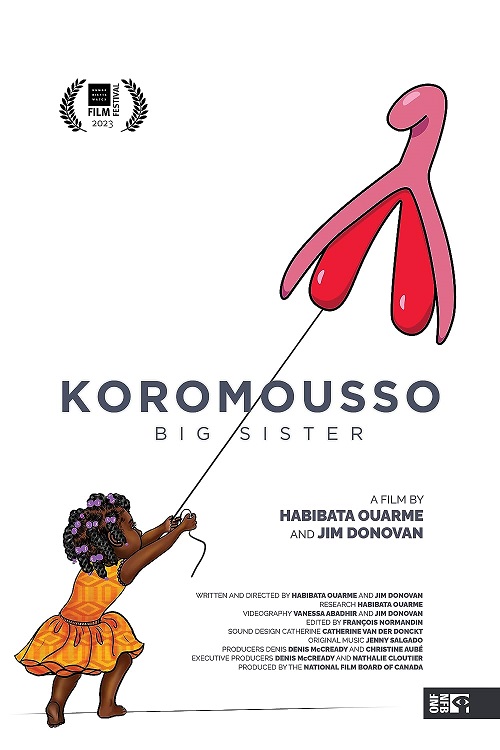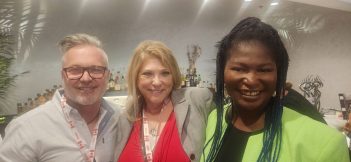By: Valerie Milano
Los Angeles, CA (The Hollywood Times) 7/30/23 – “This film is the story of women taking back what has been taken from them by this practice. Yes, we dive into all the horrible negatives, but fundamentally this is a film about empowerment and sisterhood.” Co-director Jim Donovan told The Hollywood Times about their film Koromousso- Big Sister screening today at the 21st Annual Female Eye Festival in Toronto, ON Canada.

Female genital mutilation (FGM) is a deeply rooted cultural practice that continues to affect the lives of millions of women around the world. In this documentary-style film Koromousso- Big Sister, co-directors Habibata Ouarme and Jim Donovan delve into the lifelong consequences of FGM, drawing from personal experiences and narratives shared by Habibata’s friends. By shedding light on this sensitive topic, they aim to raise awareness and encourage a global conversation about the need to eradicate this harmful practice.
 FGM, also known as female circumcision, involves the partial or total removal of external female genitalia. It is typically carried out during childhood or adolescence, often without the individual’s informed consent. This practice, deeply rooted in gender inequality and cultural beliefs, has severe physical, emotional, and psychological consequences that can last a lifetime.
FGM, also known as female circumcision, involves the partial or total removal of external female genitalia. It is typically carried out during childhood or adolescence, often without the individual’s informed consent. This practice, deeply rooted in gender inequality and cultural beliefs, has severe physical, emotional, and psychological consequences that can last a lifetime.
The physical consequences of FGM can be devastating. Immediate complications include severe pain, bleeding, infections, and even death. In the long term, women undergoing FGM may experience chronic pain, recurrent infections, urinary and menstrual problems, and complications during childbirth. These physical repercussions impact their quality of life and place an immense burden on healthcare systems.
Beyond the physical pain, FGM leaves deep emotional and psychological scars. Many women who have undergone FGM experience shame, guilt, and a loss of self-worth. They may also struggle with anxiety, depression, post-traumatic stress disorder (PTSD), and difficulty forming intimate relationships. FGM’s emotional and psychological toll is often overlooked, leaving survivors silently suffering the consequences.

While the effects of FGM are undoubtedly profound, it was crucial for this film to highlight the inspiring stories of resilience and change. Through education and empowerment, the cycle of this harmful practice can be broken. Organizations and individuals working tirelessly to combat FGM provide support, raise awareness, and promote dialogue within affected communities. By providing comprehensive sex education, fostering gender equality, and promoting women’s rights, women across the world can be freed from FGM.
A Call to Action
Female genital mutilation is a global issue that demands immediate attention. The lifelong effects of this practice impact countless women, their families, and communities. The creators of this film hope to educate, inspire, and ignite change by sharing their personal stories. Their collective responsibility is to work towards eradicating FGM, ensuring a future where all women can live free from the physical, emotional, and psychological burdens imposed by this harmful practice.
In our interview we speak with co-directors Jim Donovan and Habibata Ouarme to get more insight on how they went about making Koromousso- Big Sister, how to get involved in the cause and where we can watch the film.
Click below to see our live interview:
THT: What made this group of women want to challenge cultural norms and publicly speak about such an intimate topic?
JD: Female genital cutting has been around for hundreds of years. Meeting Habi has made me become more aware of it. Habi is an activist who is fighting to change these practices.
 Habi: Since 2006 I’ve been working on trying to help women take back control of their sexual life. It’s hard for women to talk about these issues. I wanted to approach it from the perspective of women that are living with these issues.
Habi: Since 2006 I’ve been working on trying to help women take back control of their sexual life. It’s hard for women to talk about these issues. I wanted to approach it from the perspective of women that are living with these issues.
THT: What are some of the lifelong effects of female genital and can women come back from this?
Habi: It is hard to come back because of the trauma it causes. Some of the long-term effects are infertility, problems with menstruation, with giving birth, inability to orgasm or feel pleasure from sex.
JD: Female genital cutting is the practice of cutting the clitoris off. In most cases it is done savagely in unsterile conditions to children. It plants a bomb in their body and in their minds for the rest of their lives. In our film, Habi plays a big sister whose little sister is seeking help to get surgery to repair the damage of FGM. In doing this film and getting to know these women I can see how it has hurt their lives by destroying their confidence, and their overall mood towards life. It’s a practice that serves the patriarchy in a very antique way in a mentality that is from previous times. It’s about control and that is where this film connects with other feminist’s films, which are about controlling women’s sexuality; from the state wanting to control women’s bodies with things such as, abortion laws, having to wear certain attire, and beauty standards. It all ties back to control, which is an issue we try to tackle in this film. This film is about women that are wanting to take back their control.
THT: How can others take action in the fight to help these women?
 Habi: By talking about the issue and supporting the people who are fighting for the change to happen.
Habi: By talking about the issue and supporting the people who are fighting for the change to happen.
JD: In doing this film and being invited to different film festivals where there are actually people that support this issue and advocate for change. These are the organizations that need contributions and participation. To normalize the conversation is the first step to making more people aware of such tragedies and also changing things.
THT: How did you get involved in directing and producing this film?
JD: I only directed; I didn’t produce. Habi and I are partners and before meeting her I had no idea about this issue. I tried to friend her on Facebook about eight years ago, looking for her and then I saw her on a stage talking about this and I was like “what’s this all about?” I approached the NFB with the idea to do the film with our first producer Denis McReady who’s a seasoned veteran in political documentaries. I thought this would be something that interest the National Film Board of Canada and long behold they were absolutely behind it. Except it wasn’t going to be a Jim Donovan film, but a Habibata Ouarmen and Jim Donovan film so that she could be invested in the film. She had never made a film, so I became the guy she could rely on. She’s also in the film so it is a challenge trying to shoot yourself. Although she had to when she went to Africa to document the operation in Burkina Faso.
Habi: It’s not easy. We shot it on an iPhone so that we could protect our privacy.
THT: What do you hope viewers will take away from this film?
 Habi: That there’s hope and show that we can all be a part of the change. Rather it’s speaking out about the cause, donating money to organizations, contributing your skillset rather it be mental health specialists, doctors, etc. You never know who’s living through this.
Habi: That there’s hope and show that we can all be a part of the change. Rather it’s speaking out about the cause, donating money to organizations, contributing your skillset rather it be mental health specialists, doctors, etc. You never know who’s living through this.
JD: For me it’s don’t be afraid to speak and learn. I’m a white male there could be no one further from this issue than me, but I learned about it, listened to these women, and made a film about it. I hope that it can reach the shores of the countries where this is still happening and that maybe some black men, women, and any ethnicity affected by this but especially in Africa. We are hoping they will see this, and it will change things completely.
Habi: We also wanted to reduce the stigma placed on these women, who often were not given a choice. We want to empower them and let them know that they are not alone.
THT: Where there any challenges you faced while filming?
JD: The pandemic. Managing the cast and having the patience to wait, as I come from scripted television and dramas. Money and safety were also a major factor, but we got it done!
THT: Well, we know that you will be showing the film today at noon here in Toronto. Where else can people see the film and what other festivals have you applied for?
JD: We went to London and New York with the Human Rights Watch Film Festival, and we just found out that the film has been invited to another female centric film festival in Morocco in September.
THT: How can we stay in touch with you?
Jim: You can follow the National Film Board of Canada. They post regularly about where the film is going. We are hoping for a television movie at some point. Patience is key and it’s hard to compete with the big franchises, but it is sure to be seen.
This film can be seen today, July 30th at Ted Rogers Hot Docs, at noon.

The film just won Honorable Mention today at the Female Eye Awards this morning for Feature Documentary.





